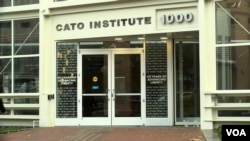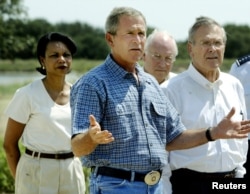* This story originated in VOA's Urdu service
You may have heard of the term "think tank" -- which usually refers to a policy or research institute where scholars provide insight and advice on political, social or economic issues.
Out of more than 1800 think tanks in the United States, nearly 400 are based in Washington. Previous administrations have relied on the research and ideas generated by such organizations to formulate policy.
Such institutions have been criticized in the past for their outsized influence on U.S. policy formulation. But there's new research showing that, compared to previous administrations, the Trump White House is far less dependent on so called 'think tanks'.
“It was pretty clear the Obama administration prided itself on being a highly intellectual administration, the administration that paid a great deal of attention to empirical research," says Mark Rom, a professor at Georgetown University. "And so, think tanks arguably had an important impact on that administration. Let me contrast that to the current administration of President Trump, who has been quite clear that it’s distrustful of experts, that it is suspicious of work done by any establishment organizations.”
In addition to influencing public policy, such institutions are often a training ground for those wishing to gain a foothold in media or the corridors of power.
“Think tanks have always had a really important role in policy making and politics. But I don’t think it’s any more influential now than it has been in the past," says Eric Rosenbach of the Belfer Center for Science and International Affairs. "And the influence is in two different ways primarily – it’s in articulating new ideas and trying to advance those, and, as in our case, its training people to go and do things. And that’s where you are actually more influential, when you are there in the government, on the Hill and you are doing something.”
Think tanks are also a revolving door for talent.
In the George W. Bush administration, Vice President Dick Cheney, Defense Secretary Donald Rumsfeld, and Secretary of State Condoleeza Rice, all came from Washington think tanks.
Lisa Curtis, a member of the National Security Council in the Trump administration, is a former scholar at the conservative leaning Heritage Foundation.
But policies and ideas are often developed through the prism of political bias so knowing who's paying for those ideas is important.
“I think the important thing for the public to know is that, when think tanks issue a report, it is important for those who are reading the report to try to understand if it was influenced by the funder or not," says Rom of Georgetown University. "And good think tanks are open and transparent in the kind of research they do so that those who read that research can judge its independence.”
How much think tanks shape and influence official US policy is debatable, but many changes in government policy or priorities can often be traced back to one of the many think tanks located in the heart of the US capital.
This report was written by Nadeem Yaqub of VOA's Urdu service

